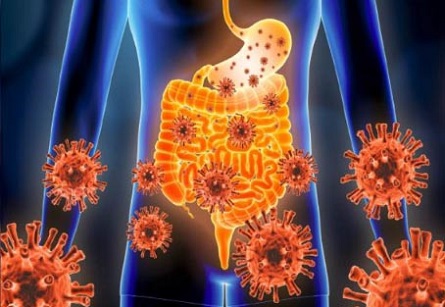Nikhil Prasad Fact checked by:Thailand Medical News Team Aug 08, 2024 1 year, 4 months, 3 weeks, 3 days, 18 hours, 17 minutes ago
COVID-19 News: COVID-19, caused by the SARS-CoV-2 virus, has been primarily known for its respiratory symptoms. However, many patients, even after recovering from the acute phase, experience persistent gastrointestinal (GI) symptoms such as abdominal pain, nausea, and diarrhea. This
COVID-19 News report dives into a recent study that explores the immune cell dynamics in the gastrointestinal tracts of COVID-19 patients, providing insights into how these immune responses contribute to the symptoms observed in long COVID-19.
 Macrophages drive inflammation and symptoms in SARS-CoV-2 infected gut
The Study at a Glance
Macrophages drive inflammation and symptoms in SARS-CoV-2 infected gut
The Study at a Glance
Researchers from the Fifth Affiliated Hospital of Sun Yat-sen University in Zhuhai, China, conducted a detailed analysis of the immune cell landscape in the GI tracts of COVID-19 patients. This study used advanced imaging techniques to map out the spatial distribution of immune cells and their interactions, shedding light on the inflammatory processes at play.
Key Findings: Immune Cell Dynamics in the Gut
The study analyzed data from 95 COVID-19 patients, focusing particularly on 11 patients who underwent gastroscopy due to GI symptoms. Using imaging mass cytometry, the researchers identified significant inflammatory responses in the GI tissues, especially in the duodenum. This inflammation was characterized by an increase in specific immune cells, including CD68+ macrophages and CD3+CD4+ T-cells.
Inflammatory Responses and Macrophages
One of the standout findings was the role of CD68+ macrophages. These cells were found in higher numbers in the duodenal tissues of COVID-19 patients. The amount of these macrophages was positively correlated with the presence of CD3+CD4+ T-cells, suggesting a coordinated inflammatory response. Interestingly, the study also found that interactions between CD68+ macrophages and other immune cells decreased in tissues positive for the nucleocapsid protein (NP) of SARS-CoV-2.
Gene Expression and Immune Response
To delve deeper, the researchers performed weighted gene coexpression network analysis (WGCNA) on RNA-seq data from the GI tissues. They discovered that a specific gene module, termed the MEgreen module, was strongly associated with macrophages and clinical parameters like total bilirubin, ALT, and AST levels. This module also showed a negative correlation with CD4+ T-cells. Gene function enrichment analyses indicated that the MEgreen module is involved in immune response activation, signaling, and regulation of inflammation.
The Role of the NF-κB Pathway
The NF-κB pathway, known for its role in immune response regulation, was found to be highly active in the GI tissues of COVID-19 patients. This pathway is typically triggered by stress stimuli such as infection and inflammation, leading to the production of proinflammatory cytokines. The study found that the NF-κB pathway was significantly more active in NP-positive tissues,
linking it to the heightened inflammatory response observed.
Immune Cell Interactions: A Closer Look
The researchers conducted a spatial neighbor analysis to understand better the interactions between different immune cells in the GI tissues. This analysis revealed a complex network of cell-to-cell interactions, with CD68+ macrophages playing a central role. In NP-positive tissues, the interaction between CD68+ macrophages and other immune cells, particularly CD4+ T-cells, was significantly reduced. This finding suggests that the presence of the virus disrupts the normal immune cell interactions, potentially leading to an unchecked inflammatory response.
Weighted Gene Coexpression Network Analysis (WGCNA)
The WGCNA provided deeper insights into the molecular underpinnings of the immune response in COVID-19 patients. The MEgreen module, which was strongly associated with macrophages, was found to be linked to several key biological processes, including immune response activation, signal transduction, and chemotaxis regulation. This module's genes were also enriched in pathways related to the VEGF and MAPK signaling pathways, both of which play crucial roles in inflammation and immune regulation.
Functional Correlation Analysis
The MEgreen module's genes were involved in critical immune functions such as cytokine binding, receptor ligand activity, and complement receptor activity. These functions are essential for the activation and regulation of the immune response, further highlighting the importance of this gene module in the inflammatory processes observed in COVID-19 patients.
Potential Therapeutic Targets
The study's findings open up potential avenues for targeted therapies. By modulating the activity of CD68+ macrophages and the NF-κB pathway, it might be possible to reduce the inflammatory response and alleviate the GI symptoms experienced by long COVID-19 patients. Additionally, targeting the VEGF and MAPK signaling pathways could offer new strategies for managing the systemic inflammation associated with COVID-19.
Implications for Long COVID-19 Management
Understanding the immune cell dynamics in the GI tract is crucial for developing effective treatments for long COVID-19. The insights gained from this study provide a clearer picture of the inflammatory processes at play, paving the way for more targeted and effective therapeutic approaches.
Conclusion: Unraveling the Immune Landscape
The findings of this study highlight the critical role of specific immune cells in the inflammatory responses within the GI tracts of COVID-19 patients. By identifying key gene modules and signaling pathways involved in these responses, researchers have provided valuable insights into potential molecular targets for treating COVID-19-related GI symptoms.
The study findings were published in the peer-reviewed journal: Frontiers in Cell and Developmental Biology.
https://www.frontiersin.org/journals/cell-and-developmental-biology/articles/10.3389/fcell.2024.1375354/full
For the latest
COVID-19 News, keep on logging to Thailand Medical News.
Read Also:
https://www.thailandmedical.news/news/covid-19-causes-gut-inflammation-especially-in-the-duodenum
https://www.thailandmedical.news/news/a-gut-microbial-metabolite-called-2-methylbutyrylcarnitine-causes-covid-19-individuals-to-have-higher-risk-of-blood-clot
